loyola llothta
☭☭☭
#China | The guided-missile destroyer USS Mustin entered China's territorial waters without permission.

China Warns of Possible Retaliation After US Military Operation
telesurenglish.net
Last edited:
#China | The guided-missile destroyer USS Mustin entered China's territorial waters without permission.

China Warns of Possible Retaliation After US Military Operation
telesurenglish.net

As the Western media had done during the opening phases of the now admittedly US-engineered “Arab Spring” in 2011, it is again attempting to lie about opposition movements across Asia attempting to oust pro-Beijing governments in favor of those that will bolster US primacy in Asia-Pacific.
This includes in Thailand where US-funded unrest is attempting to oust the current government, rewrite the Thai constitution, and roll back Thai-Chinese relations.
Reuters would write a nearly 1,000 word “profile” of Thai protest leader Anon Nampa.
Titled, “The bookish Thai rights lawyer who challenged the king,” it never once mentions the name of the organization Anon Nampa works for – Thai Lawyers for Human Rights (TLHR) – or the fact that TLHR is funded by the US government via Washington’s notorious regime change arm, the National Endowment for Democracy (NED).
A profile designed specifically to promote anti-government protests in Thailand rather than to actually inform readers of who Anon Nampa really is and who he really works for – is not journalism. It is lobbying or serves the function of an intelligence agency attempting to support Western-funded assets operating in Thailand.
The Reuters article even includes a video to help lionize both Anon Nampa and his cause which includes ousting the current Thai government and undermining both Thailand’s military and constitutional monarchy.
Again, Anon Nampa’s work for a US government-funded front is never mentioned even once.
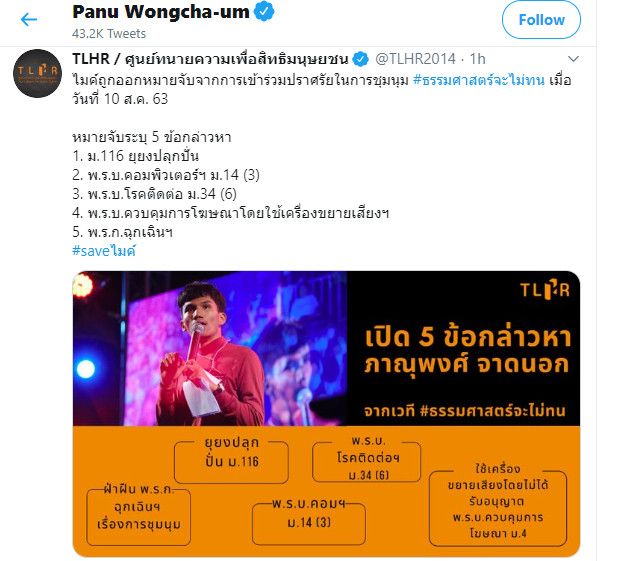
The author, Reuters’ Panu Wongcha-um is most certainly aware of who Anon Nampa is and that he belongs to TLHR – as Panu Wongcha-um regularly retweets TLHR posts on social media. Not only is it troubling that a “journalist” uses his verified Twitter account to promote protests rather than impartially observe and report on them, it suggests that Panu Wongcha-um and Reuters itself is deliberately, knowingly hiding who Anon Nampa really is and who really funds him.
It is a pattern repeated across the entirety of the Western media operating in Thailand who function more as lobbyists and even intelligence agencies rather than as journalists of any kind.
A profile designed specifically to promote anti-government protests in Thailand rather than to actually inform readers of who Anon Nampa really is and who he really works for – is not journalism. It is lobbying or serves the function of an intelligence agency attempting to support Western-funded assets operating in Thailand.
The Western media did likewise not only just last year amid US-funded unrest in Hong Kong, China, but throughout the entirety of the 2011 “Arab Spring” which eventually led to war, US military intervention, the destruction of multiple nations and the ruination of millions of human lives.
Anon Nampa and TLHR’s US Government Funding is a Documented Fact
TLHR’s US government funding was openly displayed on the US National Endowment for Democracy (NED) website in 2014.
Its name has since been removed from NED’s website but continues to receive US funding through the NED via the “Union for Civil Liberty” (UCL) of which it is a member.
The UCL is still listed on NED’s current webpage for programs it funds in Thailand.
TLHR is listed as a member of UCL on its official website next to other recipients of US NED funding including the Cross Cultural Foundation, the Human Rights Lawyers Association, and the Asian Network for Free Elections (ANFREL).
Before TLHR and its members began leading rallies – founding members admitted TLHR is entirely funded by foreign governments.
Even the Bangkok Post previously reported this – despite apparently “forgetting” this fact more recently in its reporting.
The Bangkok Post in a 2016 article titled, “The lawyer preparing to defend herself,” would admit (emphasis added):
…[TLHR] receives all its funding from international donors including the EU, Germany and US-based human rights organisations and embassies of the UK and Canada.
Thus, a front posing as “pro-democracy” and representative of the Thai people receives none of its support from people actually living in Thailand and instead – from foreign capitals with obvious ulterior motives.
In addition to an award presented by the French Embassy, the US State Department awarded TLHR member Sirikan “June” Charoensiri the 2018 “International Women of Courage Award” presented by US First Lady Melania Trump.
The US embassy in Bangkok openly praised TLHR in its own post celebrating the award, exclaiming:
The U.S. Embassy in Bangkok is proud of Sirikan “June” Charoensiri’s work as a lawyer and human rights defender, and for being recognized by the Secretary of State as an International Women of Courage award recipient.
Ms. Sirikan is a co-founder of Thai Lawyers for Human Rights (TLHR), a lawyers’ collective set up to provide pro bono legal services for human rights cases and to document human rights violations.
Thus – an organization carefully cultivated by the US government for years – propped up financially and politically and even awarded for carrying out Washington’s agenda in Thailand – is now leading protests aimed at overthrowing the elected government of Thailand.
The US National Endowment for Democracy isn’t “National” and Doesn’t Promote “Democracy”
The US NED – despite its relatively benign sounding name – is not national – but rather, operates globally. It also does not “promote freedom” or “democracy.” Instead, it uses the alleged promotion of both as cover for what is otherwise regime change aimed at nations whose governments are viewed as obstacles to US interests abroad.
The US NED was admittedly involved in the 2011 “Arab Spring” as reported by the New York Times itself in its article, “U.S. Groups Helped Nurture Arab Uprisings.” The article would admit the role of organizations like NED in training, equipping, and funding protests that eventually led to regional death, despair, irreversible economic destruction, and enduring destabilization.
The NYT would admit:
A number of the groups and individuals directly involved in the revolts and reforms sweeping the region, including the April 6 Youth Movement in Egypt, the Bahrain Center for Human Rights and grass-roots activists like Entsar Qadhi, a youth leader in Yemen, received training and financing from groups like the International Republican Institute, the National Democratic Institute and Freedom House, a nonprofit human rights organization based in Washington, according to interviews in recent weeks and American diplomatic cables obtained by WikiLeaks.
It also noted:
The Republican and Democratic institutes are loosely affiliated with the Republican and Democratic Parties. They were created by Congress and are financed through the National Endowment for Democracy, which was set up in 1983 to channel grants for promoting democracy in developing nations. The National Endowment receives about $100 million annually from Congress. Freedom House also gets the bulk of its money from the American government, mainly from the State Department.
While the NYT claims this money was spent “promoting democracy” it clearly served as cover for what was in reality a violent campaign of US-backed regime change which culminated in multiple direct US military interventions, the destruction of Libya, and the near destruction of Syria.
One thing that never materialized was “democracy.”

Also a product of the “Arab Spring” is US regime change efforts in Yemen and its military support for Saudi Arabia’s ongoing war against the country. It has led to what the UN itself has called “the world’s worst humanitarian crisis.”
Considering what US “democracy promotion” has done to North Africa and the Middle East – it would seem US attempts to replicate its “success” in Asia should be a topic of great interest for real journalists.
Yet the Western media operating in Thailand seems intent on covering up these facts specifically to allow as much momentum in favor of unrest to grow as possible – thus enabling rather than reporting on US destabilization efforts aimed at the Thai government – and the governments of other nations across the region under similar attack.
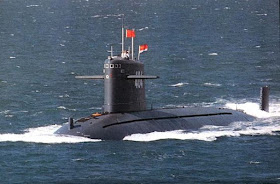
The Bangkok Post in its article, "Navy defends subs procurement, Pheu Thai vows to sink it," would note (empahsis added):
Pheu Thai spokesman Anusorn Iemsa-ard on Monday dismissed the navy's explanation as being of no consequence. The party would not step back from the issue, he said. If necessary they step up the campaign to sink the project. He warned of a street protest against the submarine procurement.Thailand is one of the few Southeast Asian countries at the moment without submarines, with nations like Myanmar, Malaysia, Indonesia, Vietnam, and even the tiny city-state of Singapore all possessing one or more.
The modernization of Thailand's navy and closer military ties with China and other pro-Beijing nations in the region would diminish the threat of Washington's open desire and already ongoing efforts to confront and contain China and its allies in the region through the use of military force.
It is not that Thailand seeks to use its submarines to sink the ships of existing enemies threatening the nation now, it is that Thailand seeks to create a credible deterrence so that it never needs to.While there are other more reasonable groups suggesting that the purchase simply be delayed so that post-COVID-19 economic recovery can be accelerated - the US-backed opposition has been opposed to the Thai-Chinese submarine deal long before the COVID-19 crisis began - and have opposed all other forms of military spending as well.
As early as 2018, articles like, "Future Forward Party vows to cut army budget," would report (emphasis added):
The Future Forward Party (FFP) has vowed to cut the military budget and reduce the number of generals in the army, according to its secretary-general Piyabutr Saengkanokkul.
"In today's world, no one engages in wars any more," said Mr Piyabutr, adding the saved money would be spread among the people, including as educational scholarships for the young and an old age allowance hike for the elderly.Another article from January 2020 titled, "Opposition targets 124-billion-baht defence budget," - before any lockdowns or any subsequent economic turmoil struck," would report:
The opposition has taken aim at the proposed 124-billion-baht budget for the Defence Ministry, with the focus of attack locked on the planned purchase of two submarines worth 22.5 billion baht.The parties mentioned in the article included Future Forward and Prachachat Party - both of which are nominee parties created by US-backed fugitive billionaire Thaksin Shinawatra and his Pheu Thai Party.
READ MORE: The Complete Guide: US Government Role in Thailand's "Student Protests"
It is clear that COVID-19 is simply the latest excuse to channel public frustration away from actually working on building the nation up, and aiming it at institutions the US-backed opposition seeks to tear down.
The opposition's argument against the deal is childish and transparently self-serving. It wants power, and the military stands in its way. The US which backs the opposition clearly desires to unravel Thai-Chinese relations - hoping to roll back everything from military purchases like the pending submarine deal, to cancelling high-speed rail projects already under construction.
The argument against the submarine deal attempt to prey on the general public's ignorance of modern warfare, basic strategy, and even basic economics.
So if Thailand does need submarines, why?
Si Vis Pacem, Para Bellum: If You Want Peace, Prepare for War
The saying, "if you want peace, prepare for war," is attributed to late Roman writer Vegetius, and expressed what was already an age-old maximum at the time - realizing that nations desiring peace needed to maintain a significant deterrence against any potential enemy's desire for war.
This sentiment is also echoed in the writings of ancient Chinese strategist Sun Tzu dating back 2,500 years ago in "The Art of War" where he stated:
The supreme art of war is to subdue the enemy without fighting.This means keeping ones military forces so well prepared, trained, and equipped for war that it would never become a matter of fighting your enemy and defeating them, because no enemy would will to fight in the first place.
Type 039A submarines are diesel electric. They are exceptionally quiet making it difficult for anti-submarine warfare units to find and destroy them. In addition to shorter range anti-ship torpedos, they can also fire CM-708 missiles and CX-1 cruise missiles which travel at ranges of up to 280 km (174 miles) from 6 torpedo tubes.
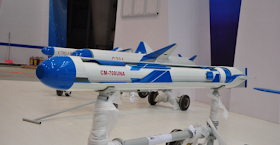
However, in order to overwhelm an enemy warship's air-defense capabilities, it would be likely that more than 4-6 missiles would need to be launched at a single time. Thus, should Thailand have 3 submarines they would be able to launch a coordinated attack - posing a serious threat to enemy surface vessels at ranges beyond an enemy's anti-submarine warfare capabilities.
Should Thailand's 3 submarines be combined with those of other nations in the region - including China - against a foreign aggressor - these capabilities would be multiplied.
It is not that Thailand seeks to use its submarines to sink the ships of existing enemies threatening the nation now, it is that Thailand seeks to create a credible deterrence so that it never needs to.

The United States is already seeking conflict thousands of miles from its own shores in the South China Sea. It has tens of thousands of its troops scattered across East Asia in Japan and South Korea, in Oceania in Australia, and even in Southeast Asia in the Philippines where they are mostly unwelcome. US troops also occupy Afghanistan which borders China to the west.
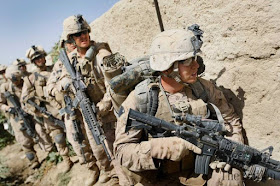
Beyond that, the US has used its military to destroy Libya, nearly destroy Syria, and transform Yemen into what the UN itself calls "the world's worst humanitarian crisis."
In order to claim that, "in today's world, no one engages in wars any more," Thailand's US-backed opposition must be living in an entirely different world.

The US has also all but announced its intentions to use military might to reestablish its primacy over Asia-Pacific - a continent and ocean away from Washington. It is developing weapons and establishing bases specifically for this purpose, while carrying out military exercises off China's shores.
in nations like Thailand are aimed also at undermining China by destabilizing and for all intents and purposes - eliminating its closest and most important regional allies.
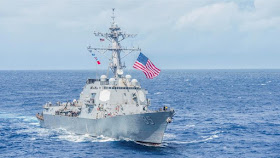
For the nations of Asia which count China as their most important trade partner, investor, source of tourism, and increasingly as an important partner for developing infrastructure - the prospect of the US encircling and containing China is a threat to all Asia.
The fact that the US is openly working to destabilize and destroy Asia as a whole to isolate and implode China, is a much more obvious and direct threat to all Asia.
For all of Asia, if it wants peace, it must prepare for war. This means creating a regional military capable of deterring the world's greatest threats. The US - for the multiple nations it has destroyed and still to this day illegally occupies and menaces - constitutes such a threat and obviously so.
China, Thailand, and other nations cooperating closer on military matters as they increase economic cooperation would create a deterrence to such a threat, limiting what it might be tempted to do, and perhaps eventually convincing the US and its allies to engage more constructively with Asia rather than seeking primacy over it.
Besides the literal children the opposition is hiding behind - the opposition itself has fielded a multitude of childish reasons they are opposed to the Thai-Chinese submarine deal. One thing that immediately reveals itself is the lack of any demonstrated knowledge by the opposition of anything relating to modern warfare, the technical aspects of the submarines in question, or how they will - or could - be used.
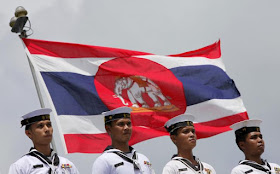
One argument is that the money could be used for something else "more important." The money is being taken from the Royal Thai Navy's own, existing budget. In order for the money to be spent on something else, the Navy's budget would need to be reduced and the funds transferred elsewhere. Since Thailand most definitely needs a navy - as all nations with a coast do - the money is already being spent on something important.
Another argument is that Thailand isn't currently fighting a war and thus doesn't need weapons.
This ignores the basic fact that in modern warfare entire conflicts can start and finish in days, weeks, or months. Waiting until war breaks out to acquire the weapons you need to fight it is not a strategy at all - and those citing it in their opposition to Thailand's military spending are either woefully ignorant of even the most basic aspects of modern warfare, or deliberately seeking to leave Thailand weak and defenseless.
The process of acquiring submarines, training sailors and preparing the vessels for combat takes years - years no nation has when a war has already begun.
One op-ed in the Bangkok Post would claim:
If bought, the future of the submarines wouldn't be difficult to fathom. Look at how we manage other military vehicles. A fleet of 25 tanks now serves as an artificial coral reef under the sea near Narathiwat while the HTMS Chakri Naruebet, Thailand's first aircraft carrier, now serves as a playground for Children's Day..Lamenting that weapons were purchased but never "used" - in other words never sent off to war - is a particularly odd stance for someone attempting to appear "progressive." In the case of the HTMS Chakri Naruebet, while it hasn't been used in war, it has been repeatedly used in major relief operations across Thai territory including during various major floods and the 2004 Indian Ocean tsunami.
Thailand's military commanders apparently understand "si vis pacem, para bellum," and that the best weapons are the ones they never have to use. They have aptly protected the nation because of this understanding. They've done so despite desk chair commentators and their inability to understand or appreciate it.
The same author would conclude by claiming:
That these submarines are to be procured for "national defence" is pretty ironic, considering so many people are barely surviving as it is.Yet at a time when "people are barely surviving as it is," the US-backed billionaire-led opposition is choosing to take to the streets, threatening political instability that will most certainly compound Thailand's post-COVID-19 economic troubles - not help them.
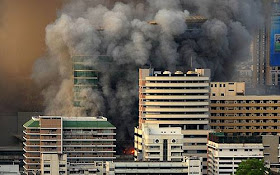
In fact - this very same opposition in 2010 took the the streets in protests that ended in armed gun battles with government troops and widespread arson killing nearly 100 and costing as much as 13 submarines. Surely, that money could have been used for something "more important."
Backing off an important defense deal with China because a loud, violent US-backed opposition threatens unrest otherwise - sets a dangerous precedent. So does caving because a "hashtag" artificially trended in opposition to the deal on a US-based social media network well known for its role in political interference abroad.
It is clear that a real global menace and its many proxies do not want Thailand to purchase these submarines. This seems to only further validate the Royal Thai Navy's decision to buy them in the first place.

This month alone, China could import between 867,000 bpd, according to Reuters’ Refinitiv data, and 900,000 bpd, according to oilfield services company Canary. And then the flow of U.S. oil into China will decline, and it will decline sharply, Reuters’ Clyde Russell wrote this week. The reason as simple as it is worrying. The U.S. crude that has been going into China since July—and reaching major records in terms of volume, with the July daily average alone up 139 percent on the year—was bought much earlier, in April, May, and June. This was oil bought when West Texas Intermediate was trading at multi-year lows. By June it had recovered to about $40, Russell notes, so purchases since then have been more modest.
But here is the worrying part: much of the oil price recovery we’ve seen since this spring was caused by rising Chinese imports, including from the United States. Rising imports are traditionally taken to mean improving demand, but this time this has not been the case entirely.
Chinese refiners have been stocking up on crude more because of the historically low prices than to satisfy growing demand.
In all fairness, oil demand has been seen as recovering pretty faster after the end of the lockdowns there but since China is not an isolated economy, its refining industry needs a recovery elsewhere in Asia and globally, and this has been slow in coming. Now, none other than OPEC is warning that a second wave of Covid-19 infections—already visible in parts of Europe, for example—will further slow down demand recovery, which will unavoidably affect Chinese oil imports.
According to Canary CEO Dan Eberhart, however, China will continue buying a lot of U.S. oil ahead of the U.S. elections. Beijing, Eberhart wrote for Forbes, would want to stay on Trump’s good side as much as possible in case he wins a second term. Reuters’ Russell is of a different opinion: he cites preliminary import estimates that point to a sharp decline in October to 500,000 bpd of U.S. oil flowing into China and a further decline in November. For Russell, it’s all about the price. For Eberhart, it’s also about politics and the trade war.
“While importing U.S. crude often doesn’t make commercial sense for China’s refiners, Beijing has directed them to continue buying as the election approaches—a sign that China knows that the trade issue with Trump will only intensify if the president wins a second term,” Eberhart wrote.
Yet not everyone agrees that politics will trump the economy. In fact, data from Chinese market research firms suggests private refiners, if not the state giants, may sharply cut their intake of foreign oil this month and next. After all, storage space is finite and Chinese energy companies have been filling it up for months now while demand has been improving but is yet to return to growth mode, even in China with its rebounding economy.
It looks like the dominant opinion is for a decline in Chinese oil imports, from the U.S. and elsewhere, in the coming months, not least because of lower refinery run rates. Reuters reported earlier this week refinery runs are set to be cut by 5-10 percent beginning this month because of a crude oil glut and weak fuel export margins. This would mean more pressure on prices. And this is not all. Some analysts expect that China may start selling the oil it bought on the cheap in the spring. Now that would be really bad news for oil prices.
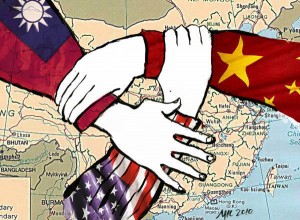
Last month, reports indicated that Washington intends a major weapons sale to Taiwan.
China’s Foreign Ministry stressed that US arms sales to the “breakaway province” breaches the one-China principle both countries agreed to decades earlier.
Taking this step by the Trump regime is another blow to bilateral relations with Beijing — already more dismal than at any time in the past half century.
Weeks earlier, China’s official People’s Daily broadsheet accused the Trump regime of “ratchet(ing) up its anti-China campaign in the days leading up to the (November 3) election,” adding:
Continued “provocations on the Taiwan question have seriously damaged China-US relations, posed serious threat to peace and stability across the Taiwan Strait, and may lead to a crisis of conflict in the region.”
On Wednesday, Trump’s State Department approved the sale of US sensors, missiles and artillery to Taiwan, a package worth around $1.8 billion.
According to Reuters, the White House is set to approve the sale of five weapons systems worth around $5 billion, including drones, anti-ship and cruise missiles.
A Taiwan Defense Ministry statement said the following:
“This arms sale shows that the United States attaches great importance to the strategic position of the Indo-Pacific region and the Taiwan Strait, and is actively assisting our country in strengthening our overall defense capabilities.”
The announced sale is the most significant US one to Taiwan since one-China became official US policy.
The latest announced sale to Taiwan is the 8th one since Trump took office in January 2017.
New York-based Taiwan Security Analysis Center director Mei Fu-hsing called the newly announced package “a breakthrough in US arms sales for Taiwan.”
According to Professor Alexander Huang Chieh-cheng, Twiwan will be the first foreign buyer to have AGM-84H cruise missiles, using F-16V fighter jets, adding:
“These systems have the range to be projected to targets along the Chinese coastal area and can perform counter-strike missions, but with limited numbers and complex targeting requirements, they are primarily for deterrence purposes.”
Supplying Taiwan with sophisticated US weapons is part of Washington’s escalated hostility toward Beijing.
On Thursday, Chinese Foreign Ministry spokesman Zhao Lijian slammed the Trump regime for “seriously violating the one-China principle,” adding:
“This not only utterly damages the national interest of China, but also sends a wrong signal for Taiwan’s separatists, which the Chinese side resolutely opposes.”
US hardliners from both wings of its war party find new ways to alienate nations over prioritizing cooperative relations in pursuit of world peace and stability — notions they long ago abandoned.
A Final Comment
On Monday, Trump’s Defense Security Cooperation Agency announced the sale of around 100 Harpoon Coastal Defense Systems (anti-ship missiles) and related weapons to Taiwan.
The $2.37 billion sale throws more fuel on a growing fire of anti-China actions by the US — widening the breach between both countries.

Since assuming the post of Assistant Secretary of Defense for Asian and Pacific Security Affairs in early 2018, Schriver has focused primarily on granting his major arms company patrons the vaunted arms deals they had sought for years.
The arms sales Schriver has overseen represent the most dangerous U.S. escalation against China in years. The weapons systems will give Taiwan the capability to strike Chinese military and civilian targets far inland, thus emboldening those determined to push for independence from China. Although no U.S. administration has committed Washington to defend Taiwan since it normalized relations with China, the Pentagon is developing the weapons systems and military strategy it would need for a full-scale war. If a conflict breaks out, Taiwan is likely to be at its center.
Returning the favor to arms makers and Taiwanese government donors
Schriver is a longtime advocate of massive, highly provocative arms sales to Taiwan who has advanced the demand that the territory be treated more like a sovereign, independent state. His lobbying has been propelled by financial support from major arms contractors and Taiwan through two institutional bases: a consulting business and a “think tank” that also led the charge for arms sales to U.S. allies in East Asia.
The first of these outfits was a consulting firm called Armitage International, which Schriver founded in 2005 with Richard Armitage, a senior Pentagon and State Department official in the Reagan and George W. Bush administrations. Schriver had served as Armitage’s Chief of Staff in State Department and then as Deputy Assistant Secretary of State for East Asian and Pacific Affairs. (Armitage, a lifelong Republican, recently released a video endorsement of Joseph Biden for President).
As a partner in Armitage International, Schriver was paid consulting fees by two major arms contractors — Boeing and Raytheon — both of which hoped to obtain arms sales to Taiwan and other East Asian allies to compensate for declining profits from Pentagon contracts.
Schriver started a second national security venture in 2008 as President and CEO of a new lobbying front called The Project 2049 Institute, where Armitage served as Chairman of the Board. The name of the new institution referred to the date by which some anti-China hawks believed China intended to achieve global domination.
From its inception, The Project 2049 Institute focused primarily on U.S. military cooperation with Northeast Asian allies — and Taiwan in particular — with an emphasis on selling them more and better U.S. arms. Schriver, known as the Taiwan government’s main ally in Washington, became the key interlocutor for major U.S. arms makers looking to cash in potential markets in Taiwan. He was able to solicit financial support for Institute from Lockheed Martin, General Atomics, BAE and Raytheon, according to the Institute’s internet site, which provides no figures on the amounts given by each prior to 2017.
Equally important, however, is the Project 2049 Institute’s heavy dependence on grants from the government of Taiwan.
The most recent annual report of the Institute shows that more than a third of its funding in 2017 came either directly from the Taiwan government or a quasi-official organization representing its national security institutions.
Project 2049 received a total of $280,000 from the Taiwan Ministry of Defense and Taiwan’s unofficial diplomatic office in Washington (TECRO) as well as $60,000 from the “Prospect Foundation”, whose officers are all former top national security officials of Taiwan. Another $252,000 in support for Schriver’s Institute in 2017 came from the State Department, at a time when it was taking an especially aggressive public anti-China line.
By creating a non-profit “think tank,” Schriver and Armitage had found a way to skirt rules aimed at minimizing conflicts of interest in the executive branch. The Executive Order 13770 issued by President Donald Trump in early 2017 that was supposed to tighten further restrictions on conflicts of interest barred Schriver from participation for a period of two years “in any particular matter that is directly and substantially related to my former employer or former clients….”
However, the financial support for Project 2049 from Boeing, Lockheed-Martin, General Atomics, Northrop Grumman and Raytheon, and from Taiwanese official and quasi-official bodies were considered as outside that prohibition, because they were not technically “clients.”
Big wins for Schriver’s corporate supporters and anti-China interests
Brought into the Pentagon at the beginning 2018 to push China policy toward a more confrontational stance, Schriver spent 2018 and the first half of 2019 moving proposals for several major arms sales to Taiwan — including the new F-16s and the air-to-ground missiles capable of hitting sensitive targets in China — through inter-agency consultations. He secured White House approval for the arms packages and Congress was informally notified in August 2019, however, Congress was not notified of the decision until August 2020. That was because Trump was engaged in serious trade negotiations with China and wanted to avoid unnecessary provocation to Beijing.
Lockheed Martin was the biggest corporate winner in the huge and expensive suite of arms sales to Taiwan. It reaped the largest single package of the series: a ten-year, $8 billion deal for which it was the “principle contractor” to provide 66 of its own F-16 fighters to Taiwan, along with the accompanying engines, radars and other electronic warfare equipment.
The seven major arms sales packages included big wins for other corporate supporters as well: Boeing’s AGM-84E Standoff Land Attack Missile (SLAM), which could be fired by the F-16s and hit sensitive military and even economic targets in China’s Nanjing region, and sea surveillance drones from General Atomics.
In February 2020, shortly after Schriver left the Pentagon, the Taiwanese President Tsai Ing-wen received the lobbyist in her office in Taipei and publicly thanked him for having “facilitated the sale of F-16V fighter jets to Taiwan and attached great importance to the role and status of Taiwan in the Indo-Pacific region.” It was an extraordinary expression of a foreign government’s gratitude for a U.S. official’s service to its interests.
Having delivered the goods for the big military contractors and the Taiwan government, Schriver returned to the Project 2049 Institute, replacing Armitage as chairman of the board.
Realizing the neocon PNAC’s vision
The arms sales to Taiwan represented a signal victory for those who still hoping to reverse the official U.S. acceptance the People’s Republic of China as the legitimate government of all of China. Ever since the 1982 U.S.-China Joint Communique, in which the United States vowed that had “no intention of interfering in China’s internal affairs or pursuing a policy of “two China’s” or “one China, one Taiwan”, anti-China hardliners who opposed that concession have insisted on making the 1979 Taiwan Relations Act, which called for the United States to sell Taiwan such arms “as may be necessary to enable Taiwan to maintain a sufficient self-defense capability” as keystone of U.S. Taiwan policy.
The neoconservative Project for a New American Century (PNAC) led by William Kristol and Robert Kagan wanted to go even further; it pushed for the United States to restore its early Cold War commitment to defend Taiwan from any Chinese military assault. Thus a 1999 PNAC statement called on the United States to “declare unambiguously that it will come to Taiwan’s defense in the event of an attack or a blockade against Taiwan, including against the offshore islands of Matsu and Kinmen.”
After leaving the World Bank in 2008 amidst a scandal involving his girlfriend, Paul Wolfowitz – the author of that 1999 statement on East Asia – turned his attention to protecting Taiwan. Despite the absence of any business interest he was known to have in Taiwan, Wolfowitz was chairman of the board of the U.S.-Taiwan Business Council from 2008 to 2018. The Project 2049 Institute was a key member of the Council, along with all the major arms companies hoping to make sales to Taiwan.
During the first days of Wolfowitz’s chairmanship, the U.S.-China Business Council published a lengthy study warning of a deteriorating air power balance between China and Taiwan. The study was obviously written under the auspices of one or more of the major arms companies who were members, but it was attributed only to “the Council’s membership” and to “several outside experts” whom it did not name.
The study criticized both the Bush and Obama administrations for refusing to provide the latest F-16 models to Taiwan, warning that U.S. forces would be forced to defend the island directly if the jets were not immediately supplied. It also called for providing Taiwan with land-attack cruise missiles capable of hitting some of the most sensitive military and civilian targets in the Nanjing province that lay opposite Taiwan.
The delicacy of the political-diplomatic situation regarding Taiwan’s status, and the reality of China’s ability to reunify the country it chooses to do so has deterred every administration since George H.W. Bush sold 150 F-16 fighter jets to Taiwan. That was, until Shriver’s provocative “Fortress Taiwan” sale went through.
The triumph of corporate and foreign interests in determining one of the most consequential U.S. decisions regarding China is likely to bedevil U.S. policy for years to come. At a moment when the Pentagon is pushing a rearmament program based mainly on preparation for war with China, an influential former official backed by arms industry and Taiwanese money has helped set the stage for a potentially catastrophic confrontation.